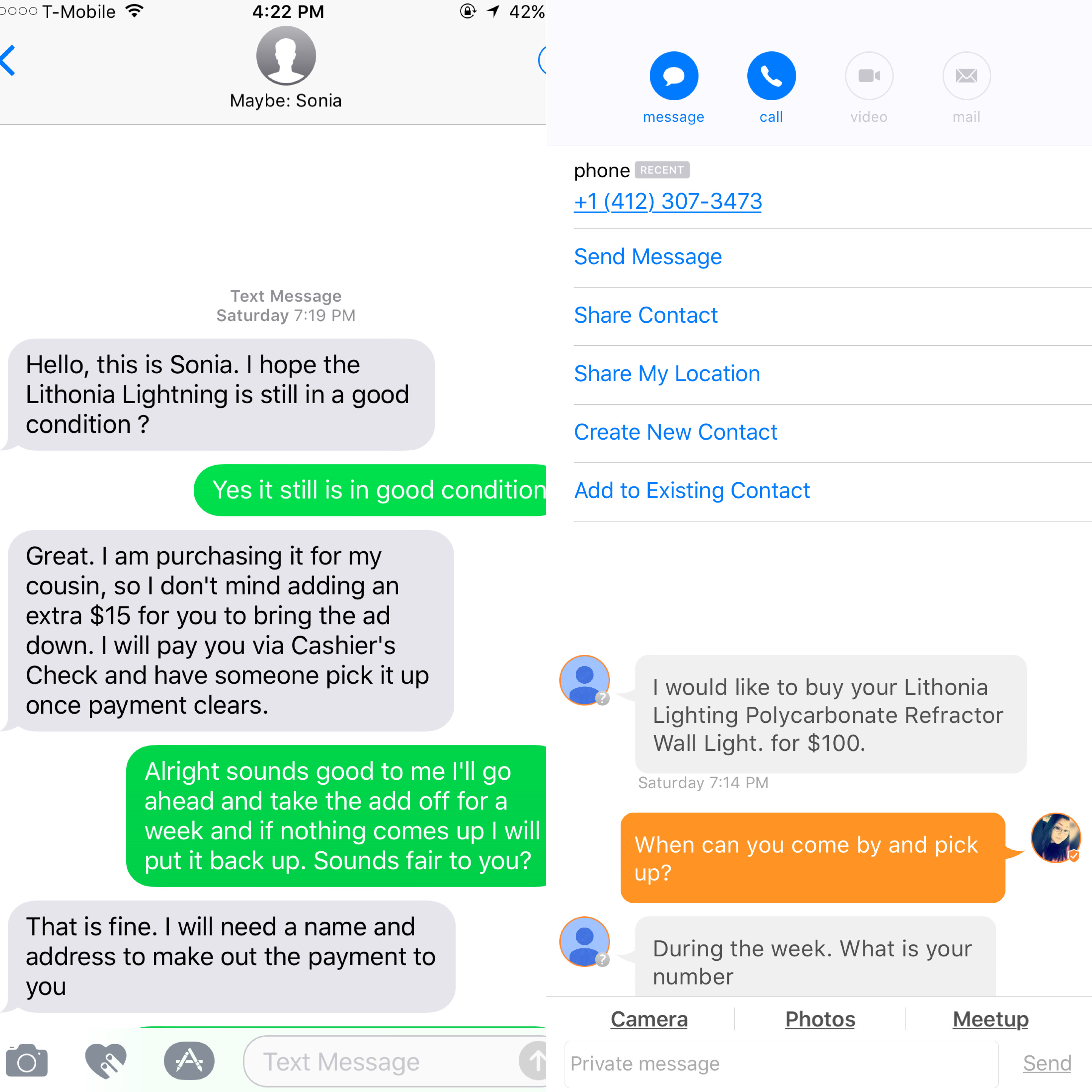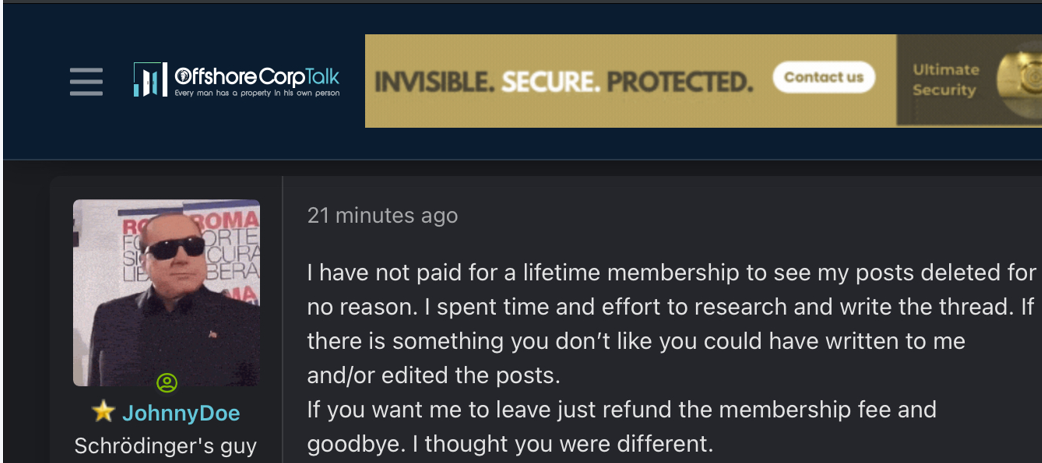Complaint Review: Fifth Third Bank - Woodmere Ohio
- Fifth Third Bank 3439 W. Brainard Road Woodmere, Ohio U.S.A.
- Phone: 216-464-1771
- Web:
- Category: Banks
Fifth Third Bank ripoff Woodmere Ohio
*Consumer Suggestion: Not typical
*Consumer Comment: Dan is a MORON!
*Consumer Comment: Art Dilger
*UPDATE Employee: Valid Fee
*Consumer Comment: Interesting Point about notaries and banks/credit unions
*Author of original report: Fifth Third Bank, Woodmere, Ohio, check cashing fee.
*Consumer Suggestion: Check-cashing fees are not abnormal for a bank
*Consumer Comment: the bank is "double dipping"
*Consumer Comment: you are right
*Consumer Comment: So you want free service?
listed on other sites?
Those sites steal
Ripoff Report's
content.
We can get those
removed for you!
Find out more here.
Ripoff Report
willing to make a
commitment to
customer satisfaction
Click here now..
I went to the branch to cash a check drawn on that bank and branch. I was asked if I had an account at that bank. I said that I did not have an account there. I was told that there would be an eight ($8.00) dollar fee to cash that check. The face value of the check was over $100.00. I asked the clerk if I was required to enter into an undisclosed contract to negotiate a payment on demand bank draft. She had no idea of what I was talking about and was referred to the manager. I again asked the manager if I must enter into a contract (knowingly, willingly and intetionally) with this bank for $8 in order to negotiate the check. She would not answer the question only stating that I would be charged an $8.00 fee. I said that I would not enter into a contract with the bank, and asked them if they were dishonoring the check after they had verified there were funds in the account and verifying my identification? At this point they wouldn't say anything other than the $8.00 fee I must pay. I walked out with the check and said I would file a report with the state banking commission for dishonorment of the bank instrument. I am a Notary and a notary has the authority to create a "Notarial Protest" for a dishonored instrument. My next step is to have a notary at that bank creat that "notarial protest." Comments would be helpful.
Daniel
Beachwood, Ohio
U.S.A.
This report was posted on Ripoff Report on 05/27/2005 01:19 PM and is a permanent record located here: https://www.ripoffreport.com/reports/fifth-third-bank/woodmere-ohio-44122-8307/fifth-third-bank-ripoff-woodmere-ohio-144222. The posting time indicated is Arizona local time. Arizona does not observe daylight savings so the post time may be Mountain or Pacific depending on the time of year. Ripoff Report has an exclusive license to this report. It may not be copied without the written permission of Ripoff Report. READ: Foreign websites steal our content
If you would like to see more Rip-off Reports on this company/individual, search here:
#10 Consumer Suggestion
Not typical
AUTHOR: Rob - (U.S.A.)
SUBMITTED: Thursday, April 01, 2010
Actually, there is no risk for a bank cashing a check that is drawn on an account at their bank. After all, they can look in the account of the person who wrote the check and see if they have enough money to cover it. Daniel is talking about a check that is wrote on a 5/3 account and he is cashing it at 5/3. In my experience it is not typical of a financial institution to charge a fee for cashing a check written on an account held by their institution.
#9 Consumer Comment
Dan is a MORON!
AUTHOR: kmiller - (United States of America)
SUBMITTED: Monday, February 22, 2010
A tad late, but OMG what a MORON....you are some idiot with a stamp, not a lawyer. Put another way, you can put lipstick on a pig, but its still a pig. The bank did not dishonor your check moron. You refused to pay the fee for the service or should I say the undisclosed contract you chose not to enter into. Since you are CLEARLY all that is bank law please tell us what statute requires banks to cash checks for free?? Seriously, dont act you have any understanding of the real world..lol I bet they all laughed at you when you left that bank!! Man..you are d-u-m-b dumb!
#8 Consumer Comment
Art Dilger
AUTHOR: Art - (U.S.A.)
SUBMITTED: Tuesday, December 26, 2006
Laura from Cincinnati... you do your bank a disservice when you make comments about how you feel regarding non-customers. They will be sure to stay that way if they ever read your comments.
I am just as frustrated as the original author regarding non-payment of checks by a bank that a check is drawn on. From my "money and baning" days a long time ago, I was taught that the check specifically says "Pay to the order of..." which means exactly that. It doesn't mean "Pay to the order of, for a fee of $10, ...". Twice I have tried to cash checks at National City Bank, drawn on NCB, and have been told I have to pay a fee because I am a non-customer. I will never do business at NCB, and I will advise friends and relatives and hope they never bank there either.
#7 UPDATE Employee
Valid Fee
AUTHOR: Laura - (U.S.A.)
SUBMITTED: Monday, December 04, 2006
Well.. being a notary really doesn't make any difference, all a notary does is verify signatures, so file all the complaints you want. Second, any bank in the country charges to cash their own checks for non-customers, it is a charge for the service, not that they are dishonoring the check. If you don't want to pay it then take it to your own bank because you are the exact type of "non" customer that tellers HATE!
#6 Consumer Comment
Interesting Point about notaries and banks/credit unions
AUTHOR: Cory - (U.S.A.)
SUBMITTED: Sunday, July 03, 2005
You bring up an interesting point about notaries and banks/credit unions. When my wife worked for that crappy credit union in SA, they use to be put in difficult positions, being a notary AND working for the credit union. One of the requirement was that a certain number of employees had to be notaries. The credit union didn't pay anymore for notaries and a few years ago, DROPPED their liability insurance.
In certain circumstances, a notary could be held liable, in civil court, in the proformance of their duties. It was kind of funny, watching management try and induce those who were dumb enough to fall for it, to become notaries. The smart ones passed. This post is just such an example of why they did.
They didn't want to be put between a rock and a hard place. Those who refused, got "red marks" on their employment records. My wife being one of them.
#5 Author of original report
Fifth Third Bank, Woodmere, Ohio, check cashing fee.
AUTHOR: Daniel - (U.S.A.)
SUBMITTED: Sunday, July 03, 2005
I am the person who originally reported the check charge. Since I did not pay the fee, the check was dishonored and thus became a dishonored instrument.
I disagree with the statement that the bank has no obligation to honor a check. The holder of the checking account has paid the fees for the account. Furthermore the check became a dishonored instrument.
I went to the library and found that a notary public has specific duties such as taking an affadavit but also has other duties one of which is to create a "Notarial Protest" for a dishonored instrument.
On June 14th, I went into the same branch and
asked for a Notary, who happen to be the same teller who I originally presented the check to. I greeted this lady and was asked how she could help me. I said that I needed the serves of a notary. She said that she was a notary and she could help me.
I told her that I needed a Notarial Protest created and recorded. She didn't know what that was, I had the handbook for notaries with me and presented it to her. I told her that one of her duties as a Notary was to create and record a "Notarial Protest"
I then eplained that the purpose of a Notarial Protest was to present a sworn statement which is admissable in court that a note (bank note, mortgage note, check etc.) had been dishonored. . . .The notary turned quite red.
The notary can be personally liable for an injured party due to the actions or in actions of a Notary.
The manager stepped into the office and got angry and said that the notary would not be creating this protest.
I told the manger that she had no authority to tell the notary that she could or could not perform the duties of a notary.
I was told by the manager that if I came back, the police would be called and I would be charged with trespassing. I left telling the manager that I would be contacting the notary commission.
I called the following attorney Mr. James French,
(from the Notary Commisssion) and explained the
situation to him.
James H French Attorney
820 West Superior Avenue Suite 510
Cleveland, OH 44113
Phone: 216-621-4260
Fax: 216-621-4262
He stated that as an employee of the bank, the notary was under no obligation to honor my request. However I disagree, the Liability of a notary states otherwise.
He stated that the notary could not put herself in conflict with the bank. I again disagree,
the public duty comes before her employement contract with the bank.
(See following pargraph:
XI. LIABILITY OF A NOTARY A notary public is a
public officer. . .)
He also said that the bank was within it's rights to ask for a fee to cash a check. I asked him if the bank was not asking me to enter into a contract to negotiate the check?
His answer was:
"Don't go there, you'll get into allot of trouble, just open an account with the bank, deposit the funds then draw your own check against the funds, withdraw the money and close the account!"
Maybe the bankers are in league with the attorneys.
I feel helpless when the laws of this country, even so simple as a notaries duties, are disregarded, ignored, and obfuscated. We have a big problem!
The sheeple have to be educated, but most of them have no idea of the freedom and liberties they have lost.
It's sometimes hopeless!
Sincerely,
Daniel
Beachwood, Ohio
- - - - - - - - - - -
From "A MANUAL FOR NOTARIES PUBLIC"
by CLINTON DeWITT L.L.D. 1889-1964
Former Professor of Law, of Western Reserve
University, Former member of the Cleveland Bar
Association
Published by the Notary Public Commission of the Court
of Common of Cuyahoga County, Ohio Copyright 1998,
Revised January 26, 1998
(Top of Page 28)
XI. LIABILITY OF A NOTARY
A notary public is a public officer whose duties are prescribed by law, and for any failure on his part to perform his whole duty, he is liable in damages to any person who suffers therefrom. His liability is not that of an insurer, but, if he is to be held liable at all, it must be on the ground of negligence, malice orcorruption. Therefore, if a notary public neglects the duties imposed upon him by law to the damage of
another, he may suffer personally. It is not intended to attempt to set forth all of the acts or ommissions to act which might result in liability against a notary public, but attention is invited to some of the more common instances where such liability has been imposed.
Page 30, XIV. DUTIES OF A NOTARY PUBLIC
A notary public may perform the following duties:
1). Administer Oaths or Affirmations
2). Certify Acknowledgments
3). Take and certify depositions, and other
instruments in writing.
4). To receive, and make and record notarial
protests.
Page 25, X. PROTESTS OF NEGOTIABLE INSTRUMENTS
Few notaries will be engaged in presenting and
protesting negotiable instruments. A notary public has the authority under the law of Ohio to present and protest negotiable instruments and in order that you may have some information the following is for your direction. The procedure requires technical perfection in the performance and should you be called upon for this duty you should acquaint yourself
thoroughly in the procedure.
A notary public's duties, in regard to negotiable
instruments, are important and his responsibility
great. Before undertaking to act as a notary public
with reference to these instruments, he should
familirize himself with at least the most generally
applicable principles of law governing the
presentation, demand, protest, and notice of dishonor
of such instruments.
The engagement entered into by the acceptor of a bill of exchange and the maker of a promissory note, is, that it shall be paid at its maturity -that is, on the day that it falls due, and at the place specified for payment, if any place be designated - upon the presentment. The engagement is absolute, but that of the drawer of a bill and the endorser of a bill or note is conditional, and contingent upon the true presentment at maturity, and notice in case it is not paid. The maker and acceptor are bound, although the bill or note be not presented on the day it falls due; but the drawer and endorsers are discharged if such presentment be not made, unless some sufficient cause
excuses the holder for failure to perform that duty.
Any bona fide holder of a negotiable instrument, or anyone lawfully in possession of it for the purpose of receiving payment, may present it for the purpose of receiving payment, may present it for payment at maturity. A notary public may thus make presentment of the instrument for payment.
PRESENTMENT FOR PAYMENT, to be sufficient, must be made: 1. At a reasonable hour on a business day;
2. At a proper place as herein later defined;
3. To the person primarily liable on the instrument,
or if he is absent or inaccessible, to any person
found at the place where the presentmant is made.
PLACE OF PRESENTMENT. Presentment for payment is made at the proper place:
1. When made at the place specified in the instrument;
2. At the address of the person designated in the
instrument to make payment;
3. When no place is specified and no address is given, then at the usual place of business or residence of the person to make payment;
4. In any other case wherever the person to make
payment can be found, or at his last known place of business or residence.
The instrument must be exhibited to the person from whom payment is demanded. Mailing a demand for payment is not sufficient.
When there are several persons, not partners,
primarily liable on the instrument and no place of payment is specified, presentment must be made to them all.
When the day of maturity falls upon Sunday, or a
holiday, the instrument is payable on teh next
succeeding business day. The time of payment is
determined by excluding the day from which the time is to begin to run, and by including the date of payment.
The insturment presented for payment should not be left by the notary public with the person to whom presentment is made unless the same has been paid in full. Upon defauld in payment the instrument should
be returned to its owner.
NOTICE OF DISHONOR. When a negotiable instrument has been dishonored by non-acceptance or non-payment, notice of dishonor must be given to the drawer and to each endorser. Any drawer or endorser to whom such notice is not given is discharged.
This notice may be given bhy the holder of the
instrument or by a notary public by whom the
presentment is made. The notice may be in writing or merely oral, and may be given by delivering through the mails.
The notice should be promptly delivered so as to reach the parties entitled thereto, if residing in the same place as that of the notary public, not later than the day folliwoing the dishonor of the instrument. When the party to be given notice has furnished his address, notice must be given at that place, otherwise at his residence or place of business.
PROTEST: When a negotiable instrument has been
dishonored it may be protested for non-acceptance or non-payment, as the case may be; but the protest is not required exceptin case of instruments originating outside the State of Ohio. However, it is common practice to protest domestic, as well as foreign, instruments.
The protest must be annexed to the bill, or contain a copy of it, must be under the hand and seal of the notary public making it. Blank forms of these protests are easily obtainable from legal blank printers or some book stores. T
The protest must be made on the day of dishonor.
The protest, or, more strictly speaking, the notarial certificate thereof, should set forth:
1. The time of presentment.
2. The place of presentment.
3. The manner of presentment.
4. The cause or reason for protesting the instrument.
5. The demand made, and the answer given, if any, to the fact that the party could not be found.
The primary purpose of a "protest" is to record the testimony of the notary public that proper stepswere taken to fix the liability of the parties obligated on the instrument. Courts regard it as prima facie evidence of all the facts stated therein, so far as they come within the scope of the notary's duties in
making the presentment and demand and protest.
(Bottom of Page 27)
#4 Consumer Suggestion
Check-cashing fees are not abnormal for a bank
AUTHOR: Ben - (U.S.A.)
SUBMITTED: Saturday, July 02, 2005
Check-cashing fees at banks for non-customers are typical. It costs money to cash a check because it's a big risk, and the fee is sort of an insurance against fraud. There is no law or rule that says banks MUST cash their own checks for non-customers for free. In fact, banks don't legally have to cash your check at all.
That said, Fifth Third's fees ARE ridiculous. I am an employee of Bank One in Cincinnati and I hear about 5/3 from people all the time. $8.00 to cash a check of ANY amount! At Bank One, we charge $3.00 for all checks over $50.00 and people still whine. I'd hate to be around at 5/3 when these people are paying $8.00 to cash a $30.00 check!!
#3 Consumer Comment
the bank is "double dipping"
AUTHOR: Cory - (U.S.A.)
SUBMITTED: Sunday, May 29, 2005
I Agree, ...That's what the writer of the check pays the bank for. To provide a service for the writer. If I take a check in to a bank, that is drawn on that bank and they TRY and charge me a fee to cash that check, the bank is "double dipping" or trying to get both of us to pay for the same service. We've had these conversations before. It came up on the guy that wanted to "just cash" a check. All the bank weenies went off about him trying to avoid taxes and so forth. I pitched in about not taking bank one checks for numerous reasons. This "check cashing" fee for cashing a check, drawn on that bank, is nothing more than a ripoff to increase profits. You have to go back and look at the whole concept of what a check really is. bank one sucks and I don't accept their checks at my shop and I'm more then glad to explain to their customer's why.
#2 Consumer Comment
you are right
AUTHOR: Armand - (U.S.A.)
SUBMITTED: Sunday, May 29, 2005
a legitamate check presented to a bank when funds are available should be paid on the spot..
no if and or buts. no fee is necessary as the writer of the check has paid for this
#1 Consumer Comment
So you want free service?
AUTHOR: Leroy - (U.S.A.)
SUBMITTED: Sunday, May 29, 2005
They are providing a service to you (cashing the check). They are charging you for this service. Why should they provide a free service to a non-customer? It has nothing to do with the check having funds behind it or not.
They were not dishonoring the check, they would simply not cash it unless you paid 8 bucks. You spout off legalese like you had a high school class in Business Law.
Pay the 8 bucks or put it through on collection in your own bank.

Advertisers above have met our
strict standards for business conduct.








































